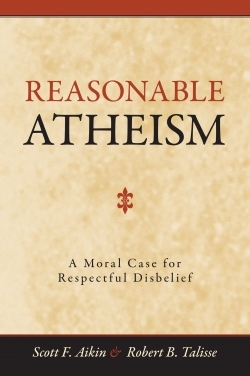Reasonable Atheism
A Moral Case for Respectful Disbelief
Contrary to what one might suspect, the authors of this “moral case for respectful disbelief” do not want to convince others to give up religion. Instead, they aim “to show that religious believers’ beliefs about atheists are false.”
The authors are philosophy professors at Vanderbilt University in Nashville, Tennessee, and, because they are atheists, they are barred from ever holding “any office in this state” because they deny “the being of God” and the existence of heaven and hell. Going further than Tennessee, the state of Arkansas also bars atheists from civil service and even claims that they are not “competent to testify as a witness in any Court.” Even the most reviled religious minority has a higher moral standing than atheists because freedom of religion does not include the freedom to reject religious belief.
Arguing that people should be able to advance “reasonable disagreement” on weighty matters, the book opposes “Presto!” and “Ontological” arguments because they rely on faulty proofs. True intellectual engagement with another’s beliefs requires breaking “Mom’s maxim” to refrain from discussions of politics and religion in “mixed company.” If people only discuss such matters within closed communities of like-minded people, they will never understand why those who disagree with them believe as they do. The authors argue that people who only know their own side of an issue know very little because they have never been challenged to articulate the reasons for their beliefs coherently or logically.
Prominent “New Atheist” writers, such as Richard Dawkins and Christopher Hitchens, are not, in the authors’ view, helpful in gaining acceptance for atheists. Their logic devolves into fallacious, unsupportable presuppositions and their main rhetorical tactic is to demonize religious believers, thereby making it easier for the devout to demonize them. It would be more effective to engage religious belief directly, arguing, for example, that many biblical laws have intrinsic moral value regardless of whether an entity called God commands them. Furthermore, they argue, if people only obey moral law because they fear punishment, their behavior many not be genuinely moral. Morality is an ethical obligation to do what is right, regardless of consequences. No one should need God to want to behave in a moral way.
Reasonable Atheism neither talks down to readers nor leaves them in the dust of philosophical jargon. It respectfully disagrees with religious belief, exposes logical fallacies that are common on both sides of the debate, and models the social discourse the authors believe is necessary for genuine tolerance and religious freedom.
Reviewed by
Elizabeth Breau
Disclosure: This article is not an endorsement, but a review. The publisher of this book provided free copies of the book to have their book reviewed by a professional reviewer. No fee was paid by the publisher for this review. Foreword Reviews only recommends books that we love. Foreword Magazine, Inc. is disclosing this in accordance with the Federal Trade Commission’s 16 CFR, Part 255.

